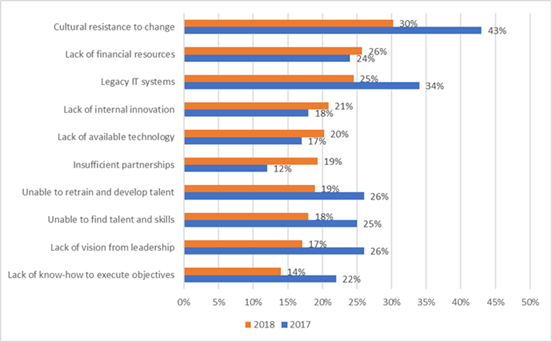Cornerstone OnDemand (NASDAQ: CSOD) a global leader in cloud-based learning and human capital management software, has today announced Cornerstone and IDC's new study: “Future Culture: Building a Culture of Innovation in the Age of Digital Transformation.” The study, which explores the relationship between European organisations’ speed of innovation and talent management, shows that tell-tale signs of an organisation’s speed of innovation include: how they find talent, their appraisal process, how employees recommend the organisation they work for to others, and how much employees collaborate.
For this research, IDC developed four archetypes of organisations, ranking companies based on their level and type of innovation and their operational and product/service innovation. The research shows that organisations with a steady stream of new products and services are more likely to have an ongoing feedback process with employees, rather than an annual performance review, while organisations with a slower rate of innovation often use coaching and mentoring to develop employees.
Read the report to find out more about what factors distinguish the different organisational archetypes, the impacts on speed of innovation, and the link to talent management in the age of digital transformation: “Future Culture 2018: Building a Culture of Innovation in the Age of Digital Transformation.”
British Companies are Serious About Digital Transformation, but Challenges Remain
The study found that only 9 percent of British companies have not started their digital transformation, indicating that it’s a high priority in the region. Some challenges remain though, with cultural resistance to change being cited as the biggest digital transformation barrier for UK companies for the second year in a row. Optimistically, however, the proportion of companies citing it as a barrier to digital transformation has dropped from 43 percent in 2017 to 30 percent in 2018.
Additional barriers in the UK suggest that organisations are coming to terms with digital transformation, but that the challenges are shifting from strategic to executional. Other top barriers include a lack of internal innovation (21 percent), lack of financial resources (26 percent), insufficient partnerships (19 percent), and lack of available technology (20 percent).

Source: 2018 IDC European study sponsored by Cornerstone OnDemand “Future Culture: Building a Culture of Innovation in the Age of Digital Transformation.” Copyright IDC 2018.
Today’s UK Talent Trends
- British companies prioritise internal recruiting (53 percent) and job platforms (51 percent) in recruitment over other means such as university traineeship programs (37 percent). They also rank job skills (57 percent), education (41 percent), and problem-solving abilities (35 percent) as the most important recruitment criteria, suggesting they may favour traditional skill requirements.
- On-the-job training is the most important employee development practice for both UK (46 percent) and European (49 percent) companies. However, British companies are more likely than European companies to leverage online courses for learning (32 percent vs 30 percent), suggesting that they may be slightly more advanced than European organisations in their adoption of digital learning tools and resources.
- Positive workforce sentiment is increasing with 48 percent of respondents showing a positive sentiment towards their workplace compared to 41 percent in 2017 and 46 percent in 2016. Much of the sentiment increase from 2017 to 2018 was found to be due to greater positivity towards the attractiveness of the workplace, and suggests that the dip in sentiment in 2017 may have resulted from a mix of the uncertainty in roles and sectors surrounding Brexit as well as the destabilising impact of digital transformation initiatives.
Comments on the news
“Digital transformation continues to be an increasing priority for British companies, and their focus now is to ensure they have the resources, infrastructure, investment and people in place to continue making it successful in the region. While it may seem like a big task, we’re confident that with positive workforce sentiment increasing as Brexit uncertainty plateaus, UK companies will continue to realise successful digital transformation,” said Vincent Belliveau, executive vice president and general manager EMEA, Cornerstone OnDemand. “As we enter the Skills Economy, employees and customers will demand more of organisation leaders. Technological advancements like automation and artificial intelligence have propelled us into a world where businesses need to develop and embrace new skills and ways of working that drive innovation. Our report with IDC intrinsically links speed of innovation and talent management – putting the emphasis on making bold yet impactful talent management changes to thrust your organisation towards success.”
Largest study of its kind
This is the third year Cornerstone OnDemand and IDC have conducted a major European study, with this year’s study being the largest of its kind. This year’s topic focuses on innovation and organisational culture. Almost 2,000 interviews were conducted with HR, IT and line of business managers in companies with more than 500 employees from 14 countries, including the UK.
To find out more, download the full report here



